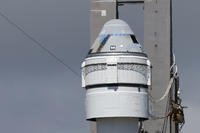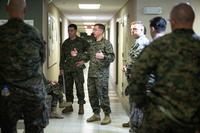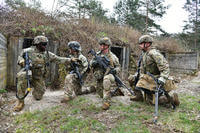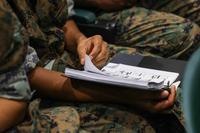When looking to develop fifth- and even sixth-generation aircraft, the U.S. military must realize that superiority in the sky will be more about information than speed.
That's according to Marine Corps Lt. Col David "Chip" Berke, a stealth fighter pilot who wants service members and policymakers to better understand that future wars will require fighter aircraft that can better collect and pass information -- not simply outrun an enemy.
"For a few months, I was enamored with how powerful that thing was -- the F-22 is the most powerful form of airplane … it's the most impressive performing aircraft out there," Berke, the first Marine to fly an Air Force F-22, said Monday at a Mitchell Institute for Aerospace Studies sponsored event in Washington, D.C.
"And the least impressive thing about the F-22 is how powerful it is," he said at the event, which hosted F-35 and F-22 pilots during a discussion about air combat with fifth-generation fighter jets.
Berke, a former "Top Gun" instructor pilot, flew the Raptor between 2008 and 2011 before becoming the commanding officer at the Corps' first operational F-35B Lightning II squadron.
"Once you get past, 'Wow this thing is cool' -- and it's great to have that, don't get me wrong -- but it's what's on the inside … and how the plane can evolve internally over time [that matters]," he said.
Continuing to evolve and upgrade an aircraft -- from network nodes to software to the guts of the plane -- is precisely why it doesn't become obsolete, Berke continued. It's why technological advances are necessary in order to keep up in a rapidly-changing world, one where "speed isn't exactly your most valuable tool," he said.
RELATED: Former B-2 Pilot to Air Force: Forget Drone Bombers
Berke's comments come at a time when the Air Force is working round-the-clock with defense industry wonks to boost current systems, especially for aircraft that fall decades behind their F-22 and F-35 counterparts.
For example, Boeing Co. and the Air Force just signed an agreement to forge new electronic warfare countermeasures in more than 400 F-15Cs and Es, according to reports. The contract, worth $478 million, is one of many that will propel the F-15 well into the information age.
"The truth of the matter is, information is life, more is better, period," Berke said, "and more than likely, in a 21st-century battle, without information, the fastest plane out there is the first one to die.
"Not a pilot in the world who flies a fifth-gen airplane will tell you the most impressive thing about it is what you see on the outside -- as impressive as it is, it's at the bottom of the list of things you need to be relevant to be successful in combat," Berke said.
"One-hundred percent of the time, 100 pilots will pick information," he added. "It's the most valuable commodity that's out there."









